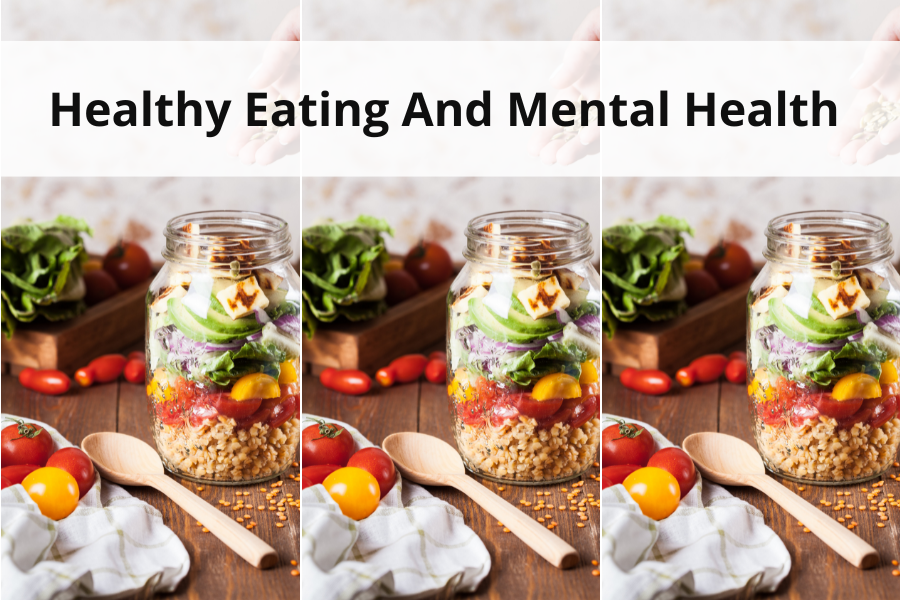This post is about healthy eating and mental health.
This post may contain affiliate links, which means I’ll receive a commission if you purchase through my link at no extra cost. Please read the full disclosure here.

Caring for our bodies and minds is essential in today’s busy world.
When you improve one, you also improve the other.
This blog post explores how eating healthy can significantly affect our thoughts and feelings.
Healthy eating and mental health.
Here are some practical tips and strategies to help you make positive changes and nourish your mind and body.
1. How Food Affects How We Feel

Food can impact our mood and mental health.
Our brains don’t function at their best when not feeding ourselves the most nutritious foods.
If we neglect healthy foods and only eat junk food or quick and easy snacks, our brains can’t work correctly. When this happens, it affects our thoughts and feelings.
If we go too long without eating wholesome meals and skip meals, it can also have a harmful effect on our brains.
Nutrition Australia states that going long periods of time without eating can cause a drop in blood sugar levels, leading to feeling tired and irritable. Read more here: Nutrition Australia
Good Foods for a Healthy Mind:
- Fatty Fish, Nuts, and Seeds: These foods contain special healthy fats called omega-3 fatty acids, making us feel happier and keeping our brains healthy.
- Leafy Greens, Beans, and Whole Grains: These foods have B vitamins that help our brains make chemicals that make us feel good, like serotonin.
- Colourful Fruits and Veggies: Fruits and veggies with bright colours contain antioxidants. Generally, these antioxidants can help our brains stay healthy and prevent problems with our mental health.
2. Our Gut and Our Mind

Our gut includes our stomach and intestines. These are linked to our brains. The gut often sends signals to the brain. This means that when our gut is not working correctly, it affects our mind and mood.
The negative signals our gut sends to our brains can result in mental health issues, including anxiety, stress and depression. Due to this, we must eat the right foods to keep our gut and mind in good shape.
Good bacteria from food in our gut can create a healthy mind. Foods like yogurt, sauerkraut, and kimchi have good bacteria. When these good bacteria keep our gut healthy, positive signals are sent to our mind improving our mental well-being.
Prebiotic foods are also important. Bananas, garlic, and onions are examples of prebiotic foods. As a matter of fact, these foods feed the good bacteria in our gut, helping them grow. In turn, it will strengthen a positive gut-brain connection.
The gut is not only the seat of all disease, but it is also the seat of all feelings.
Dr. Antonie Bechamp
To learn more about the link between the gut and the brain, visit: Harvard Health
3. Sugary and processed foods are relevant to a negative mood.

Processed foods with unhealthy fats and sugars can cause inflammation in our bodies.
The inflammation that unhealthy foods cause in our bodies also affects the mind.
Too much sugar can make us feel down; additionally, when it causes our bodies to flare up, our minds do not work at total capacity. As a result, it is crucial to limit our consumption of such foods and prioritise whole, unprocessed options for better overall health.
Excessive sugar consumption can wreak havoc on our mental well-being, impairing focus, mood, and overall cognitive function. Nourishing our bodies with wholesome foods is a powerful way to support a healthy mind.
Dr. Drew Ramsey, Psychiatrist and Nutrition Expert
To learn more about food and your mind, visit here.
3. Mindful Eating for Feeling Better

Being mindful means paying attention to what we’re eating.
When we take the time to eat mindfully, we can then better understand when we are full. If we eat past feeling full, we can cause harm to our bodies and mind.
Becoming aware of fullness from food and whether we are hungry will help us have a healthier relationship with food. Furthermore, it means we will have less emotional eating.
Here are the best ways to practice mindful eating:
- Paying attention: Mindful eating involves being fully present and attentive while eating, focusing on the sensory experience of each bite.
- Slowing down: It encourages taking the time to eat slowly. When we do this, we savour the flavours and textures of the food, and are mindful of the body’s hunger and fullness cues.
- Non-judgmental awareness: It involves observing thoughts, emotions, and physical sensations. Basically, we start to eat without judgment or criticism.
- Engaging the senses: Mindful eating encourages engaging all the senses while eating, noticing the aroma, taste, and texture of the food.
- Emotional connection: Simply put, it means understanding your food-related emotional triggers. Essentially, it involves developing a deeper understanding of how your feelings can impact the way you eat.
- Appreciating food: Mindful eating focuses on having gratitude for food’s nourishment. Also, it allows the pleasure that food brings without toxic overthinking of food.
- Mindful portioning: This involves being aware of portion sizes and choosing amounts that satisfy hunger without overeating.
- Conscious food choices: Mindful eating encourages making intentional choices about foods. As a matter of fact, this nourishes the body and heals the mind.
To learn more about mindful eating, go here.
Final Thoughts

By eating healthy foods, we can also improve our mental well-being.
- Foods rich in omega-3 fatty acids, B vitamins, and antioxidants can significantly boost our mood and brain health.
- Avoid a lot of sugar and quickly processed snacks. This will help to prevent lower moods.
- Take time to eat mindfully. As a result, you will enjoy a balanced diet contributing to your overall well-being.
Feel better today with healthy eating and better mental health.
This post was about healthy eating and mental health.

